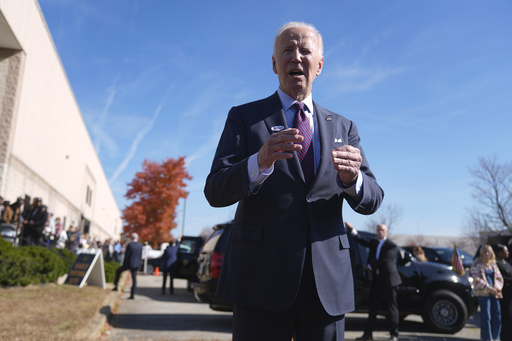
With the U.S. presidential election approaching in just one week, the Biden administration remains hopeful for potential temporary cease-fire arrangements between Israel and Hamas in Gaza, as well as Israel and Hezbollah in Lebanon.
However, U.S. officials recognize that the prevailing political uncertainty within the U.S. has caused both parties to hesitate when it comes to committing to substantial agreements until the outcome of the election becomes clear.
Meanwhile, tensions in the Middle East rise following Israel’s recent military actions targeting Iranian facilities, which were executed in response to Iranian ballistic missile attacks that occurred earlier this month.
U.S. officials believe these Israeli strikes, which were carried out following coordination with Washington, will not provoke a major escalatory response from Iran; however, they caution that outcomes remain unpredictable.
The Biden administration successfully encouraged Israel to limit its military response, receiving assurances that sensitive sites such as those related to nuclear or oil operations in Iran would not be targeted, which could have led to an escalation of hostilities.
As a longstanding ally of Israel and a crucial mediator in Middle Eastern affairs, the U.S. continues to advocate for movement towards a cease-fire, despite previous disappointments and low expectations for immediate diplomatic breakthroughs.
Jon Alterman, who heads the Middle East Program at the Center for Strategic and International Studies, commented that “the Israelis are not feeling a strong sense of urgency” now compared to several months ago.
As the humanitarian crisis in Gaza worsens, the Biden administration is supporting an Egyptian proposal that aims for a temporary two-day cease-fire, potentially allowing Hamas to release a small number of hostages and improving access for humanitarian relief into the region, according to U.S. officials.
President Joe Biden expressed his commitment to discussing this proposal with his team, urging an end to the ongoing conflict.
“We need a cease-fire. We should end this war. It should end. It should end. It should end,” Biden reiterated during a recent statement.
One official mentioned that the administration is open to nearly any initiative that would alleviate the suffering of Palestinian civilians and facilitate the release of hostages but acknowledged that they are not eager to anticipate positive outcomes.
Secretary of State Antony Blinken’s recent trip to Israel, Saudi Arabia, and Qatar was intended to assess regional willingness for a cease-fire.
While officials reported a degree of cautious optimism following these meetings, they acknowledged that previous hopes had been dashed.
“What we really have to determine is whether Hamas is prepared to engage,” Blinken noted, adding that the assassination of Hamas military chief Yahya Sinwar might create a more favorable environment for discussions around a cease-fire that has been stalled for some time.
CIA Director William Burns’ participation in discussions over the weekend in Doha with Israeli and Qatari officials emphasized U.S. backing for a resolution, although immediate successes were not achieved, and lower-level dialogues are anticipated to progress this week.
The chances of even a modest cease-fire plan succeeding seem precarious, as Hamas, despite suffering significant losses, continues to demand a complete truce and the withdrawal of Israeli forces from Gaza.
While Hamas has yet to formally acknowledge the Egyptian proposal, Israel has indicated a readiness to consider it.
U.S. officials suggest that long-term strategies for Gaza’s post-conflict future are still being developed, with Israel’s military evaluations playing a pivotal role in crafting what potential agreements could look like.
Thus far, Israel has firmly opposed any governance or security role for the Palestinian Authority in Gaza, which poses a significant challenge for both the Authority and Arab nations whose support is essential for any viable plan to take root.
Even beyond the implications of the upcoming U.S. elections, analysts like Alterman point out that Israel shows little indication of being motivated to pursue a cease-fire at present.
“From what I know, it doesn’t feel like we are on the brink of a breakthrough,” Alterman explained.
In Lebanon, U.S. officials acknowledge the challenge of achieving a short-term resolution, given the country’s fragmented political leadership and Israel’s growing military offensive against Hezbollah, which has been ongoing for the last month.
The lack of trust from Israeli officials towards Lebanon’s political leaders complicates the situation, as does the inability of the Lebanese Armed Forces to effectively restrain Hezbollah fighters from launching attacks against Israel from the southern region.
Amos Hochstein, a Biden aide who has worked on initiatives to prevent full-scale conflict between Israel and Hezbollah, is expected to visit the region this week to assess Israeli officials’ stances regarding potential support for peace measures.
Following his discussions, Hochstein may also travel to Lebanon to gauge what officials there might be willing to do to stop further Hezbollah rocket strikes aimed at northern and central Israel.
Compounding the challenges in both Gaza and Lebanon, neither Hamas nor Hezbollah have announced new leadership following the elimination of key figures in recent weeks.
